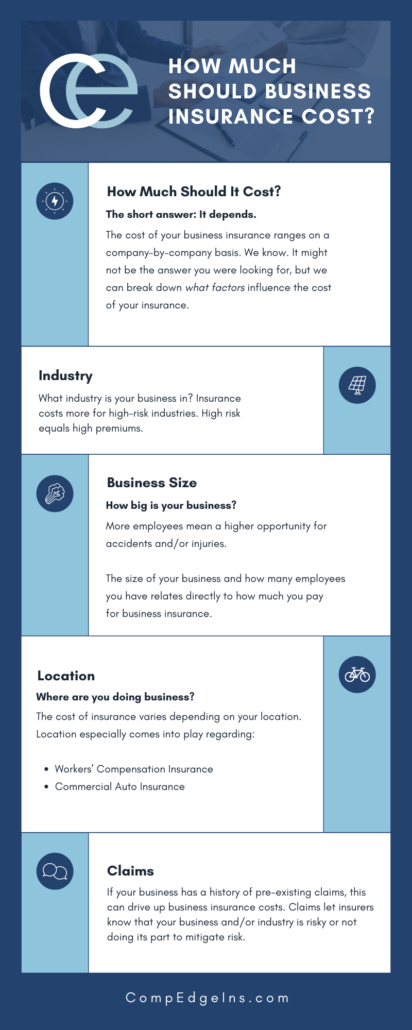Understanding Business Insurance Costs: What You Need to Know
As a business owner, protecting your company from unforeseen risks is paramount. Business insurance is one of the most essential tools for safeguarding your assets, employees, and operations. However, understanding the cost of business insurance can be a bit overwhelming, especially if you’re new to the world of insurance. In this comprehensive guide, we’ll break down the factors that influence business insurance costs, help you understand what you’re paying for, and provide insight into how you can optimize your insurance for the best value.

What Is Business Insurance?
Business insurance is a broad term that refers to various policies designed to protect your business against potential financial losses from unforeseen events. These can range from accidents and injuries to lawsuits and natural disasters. The main types of business insurance include:
- General Liability Insurance: Covers basic risks like customer injuries or property damage.
- Professional Liability Insurance: Protects against claims of negligence or mistakes in professional services.
- Property Insurance: Covers damage to your physical assets like buildings, equipment, and inventory.
- Workers’ Compensation Insurance: Provides benefits to employees who are injured on the job.
- Commercial Auto Insurance: Covers vehicles used for business purposes.
Each of these policies serves a specific purpose and can be tailored to your business needs.
Factors That Influence Business Insurance Costs
The cost of business insurance varies widely depending on several key factors. Understanding these factors will help you estimate how much you can expect to pay for insurance premiums and how to get the best coverage for your budget.
1. Type of Business and Industry
The nature of your business and the industry you operate in plays a significant role in determining your insurance costs. High-risk industries, such as construction, healthcare, or transportation, typically face higher insurance premiums due to the greater likelihood of accidents, claims, and lawsuits. On the other hand, low-risk businesses like consulting or IT services may pay lower premiums.
2. Size of the Business
Larger businesses generally have more assets, employees, and operations to cover, so the insurance premiums will naturally be higher. For small businesses or startups, the costs are often more manageable, but as the business grows, you may need to reassess your coverage and budget for higher premiums.
3. Location
Your geographical location can impact insurance costs, as risks and regulations vary by region. For example, businesses located in areas prone to natural disasters, such as hurricanes, floods, or earthquakes, may face higher premiums for property insurance. Additionally, local regulations and state laws can influence the type and amount of coverage required.
4. Claims History
If your business has a history of frequent claims, your premiums will likely increase. Insurance companies view a history of claims as a risk factor, and they may raise premiums to account for the increased likelihood of future claims. Maintaining a clean claims record is essential for keeping your insurance costs down.
5. Coverage Limits and Deductibles
The level of coverage you choose and your deductibles will directly affect your premiums. Higher coverage limits and lower deductibles typically result in higher premiums, but they provide more comprehensive protection in the event of a claim. Conversely, choosing higher deductibles can lower your monthly premiums, but you’ll be responsible for more of the out-of-pocket costs when a claim is made.

Types of Business Insurance and Their Costs
To further understand the cost of business insurance, it’s important to look at the premiums for each type of policy. Here’s a breakdown of some of the most common types of business insurance and their typical costs:
1. General Liability Insurance
General liability insurance is one of the most basic forms of coverage, and almost every business needs it. This policy covers third-party bodily injury, property damage, and advertising injury claims.
- Average cost: Small businesses can expect to pay anywhere from $300 to $1,000 per year for general liability insurance.
- Factors that affect cost: The size of the business, industry, and claims history.
2. Professional Liability Insurance
Also known as errors and omissions (E&O) insurance, professional liability insurance protects businesses against claims of negligence or mistakes in the services provided.
- Average cost: Premiums for professional liability insurance range from $500 to $2,000 per year for small businesses.
- Factors that affect cost: The type of professional services offered and the level of risk involved.
3. Workers’ Compensation Insurance
In most states, businesses are required by law to carry workers’ compensation insurance, which covers medical expenses and lost wages for employees who are injured on the job.
- Average cost: The cost of workers’ compensation insurance is typically based on payroll size and industry. Small businesses can expect to pay $0.75 to $2.74 per $100 of payroll.
- Factors that affect cost: Industry type, the number of employees, and the claims history.
4. Property Insurance
This type of insurance protects physical assets such as buildings, equipment, and inventory from risks like fire, theft, and vandalism.
- Average cost: Property insurance premiums typically range from $500 to $2,000 per year, depending on the value of the property and the level of coverage.
- Factors that affect cost: The size of the property, location, and value of assets.
5. Commercial Auto Insurance
If your business owns vehicles, commercial auto insurance provides coverage for accidents involving company vehicles.
- Average cost: Commercial auto insurance typically costs $1,200 to $2,400 per year for a fleet of vehicles.
- Factors that affect cost: The number of vehicles, driving history, and the type of vehicles used.
How to Lower Your Business Insurance Costs
While business insurance can be a significant expense, there are several strategies you can implement to reduce your premiums without compromising on coverage. Here are some tips to help lower your business insurance costs:
1. Bundle Your Policies
Many insurance providers offer multi-policy discounts if you bundle multiple insurance policies together, such as general liability, property, and commercial auto insurance. Bundling can save you up to 25% on your premiums.
2. Increase Your Deductibles
Increasing your deductibles can lower your premiums significantly. However, make sure you can comfortably afford the deductible amount in the event of a claim. It’s a balance between saving on premiums and ensuring you’re financially prepared to cover any claims.
3. Improve Risk Management
Insurance companies reward businesses that take proactive measures to reduce risk. Implementing safety protocols, employee training, and preventative maintenance can help reduce the likelihood of claims, which could lead to lower premiums over time.
4. Shop Around
Don’t settle for the first quote you receive. Different insurance companies offer varying rates for similar coverage, so it’s important to shop around and compare quotes from multiple providers to find the best deal for your business.

FAQs About Business Insurance Costs
1. How are business insurance premiums calculated?
Premiums are typically calculated based on the type of business, size, location, industry, claims history, and coverage limits. Insurance companies assess these factors to determine the risk associated with insuring your business.
2. Can I reduce my business insurance costs if I have a good claims history?
Yes, a clean claims history can often result in lower premiums. Insurance providers consider businesses with fewer claims to be lower risk and may offer discounts or better rates as a result.
3. Do I need insurance for every aspect of my business?
While not all types of insurance are required by law, it’s a good idea to have coverage for major risks. Even if your business is not legally required to carry a particular policy, it’s still worth considering protection for unforeseen events that could result in substantial financial loss.
4. How often should I review my business insurance?
It’s essential to review your business insurance annually, especially if you experience significant changes in operations, revenue, or employee count. Additionally, review your coverage if you move locations, launch new products, or make any major business changes.
Conclusion
Understanding business insurance costs is crucial for making informed decisions about how to protect your company. While premiums can vary widely depending on a variety of factors, knowing what to expect and how to reduce costs will ensure you find the right coverage at the best price. Whether you’re a small startup or an established corporation, business insurance is an investment that provides peace of mind and financial security.
For more information on business insurance, check out Investopedia or consult with a trusted insurance agent to get tailored advice for your specific business needs.

